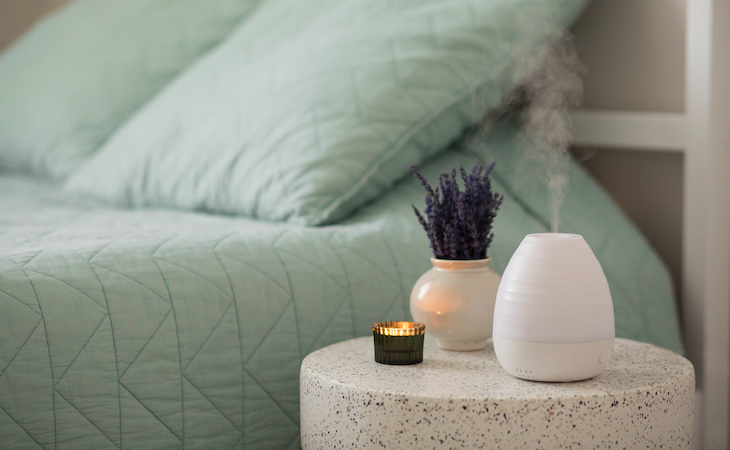Having trouble falling asleep? If you’re at the end of your rope trying to count sheep, maybe it’s time to try something new.
Our suggestion? Turning to aromatherapy and essential oils. Aromatherapy is a powerful tool to help you sleep—breathing in highly concentrated oils can help you relax, calm the mind and nervous system, and bring a sense of ease to your evening ritual.
One way to incorporate aromatherapy and essential oils into your sleep routine is with an essential oil diffuser. Not only do diffusers bring a zen, spa-like experience to the atmosphere around you, but they can help alleviate anxiety and improve your mood too.
Intrigued? Keep reading to discover all the essential oil diffuser benefits to get a good night’s sleep.
What is a diffuser?
In its simplest terms, an essential oil diffuser releases oils into the air through a scented mist. But it goes so much deeper than that.
“Diffusers are wonderful ways to utilize essential oils through the olfactory route, as opposed to the topical route, such as in skincare,” says Françoise Decatrel, aromatherapist, herbalist, and founder of The Way Apothecary.
Decatrel explains that diffusers do so much more than just add fragrance to the air. “When we inhale aromatic molecules, they bind to specific receptors in the brain,” she says. “This can affect mood, sleep, and hormonal balance.”
There are multiple types of diffusers on the market, all of which release essential oils into the air in different ways.
The four main types of essential oil diffusers are:
Ultrasonic diffuser
An ultrasonic diffuser combines water with essential oils before evaporating the oils into the air. This type of diffuser may also include humidifying benefits.
Nebulizing diffuser
This type of diffuser releases the aroma in a fine mist without water, so there are no additional humidifying benefits.
Evaporative diffuser
This diffuser has both a filter with essential oil and a fan that blows the oil through the air.
Heat diffuser
The heat diffuses the essential oils into the air, either with a candle or an electrical source. There are no therapeutic benefits to a heat diffuser.
Benefits of diffusers
When it comes to using an essential oil diffuser, the benefits seem almost endless.
“Whatever your goal might be with aromatherapy, diffusion allows you to experience the benefits in your environment as you go about your day or night, simply by breathing,” says Jessica Wiehle, aromatherapist and the Founder and President of AromaWell.
We’ve broken down the most important benefits below:
Sleep
Diffusing certain essential oils, like lavender, can help promote more restful sleep. It can also help people fall into REM sleep.
“This plays a pivotal role in processing stress and emotions, contributing significantly to our overall psychological equilibrium,” says Wiehle.
Decatrel agrees. “Sleep is so important,” she says. “It’s the time when our body restores itself. Essential oils are a wonderful way to wind down from a busy day and prepare oneself for a peaceful night’s sleep.”
Air quality
Cleaner air inside your home? It’s possible when you use a diffuser. “Diffusers have antimicrobial properties that purify the air, promoting a healthier atmosphere,” says Debra Levy, certified aromatherapist with Glow Tribe Wellness.
Respiratory health
If it’s feeling tough to breathe—especially during cold and flu season—a diffuser may help your ragged breaths.
“Diffusing essential oils helps to cleanse the air,” Wiehle says. “[Essential oil blends] aid in decongestion during colds or allergy season, both day and night.”
Stress reduction
Feeling stressed? It may be time to breathe in an essential oil diffuser’s benefits.
“We can use oil to relax and mitigate the stress response, calm fears, work through trauma triggers, and also to ground ourselves during times of anxiety,” says Decatrel.
Essential oils for diffusers
Now that you know the benefits of incorporating an essential oil diffuser into your sleep routine, you may be wondering—what essential oils should you use, anyway? Luckily, we’re here to help.
Lavender
Wiehle, Decatrel, and Levy all agree that lavender is a powerful essential oil to promote better sleep.
A study published in Scientific Reports found that inhaling lavender before bed increased how much deep sleep participants experienced.
“This essential oil encourages a sense of calmness and assists in unwinding after a tough, long day,” Levy says.
Patchouli
While patchouli is a pretty strong scent with a love-or-hate relationship, it should be noted for its relaxing benefits.
“This makes a great oil for those suffering from anxiety or panic attacks,” says Decatrel. She recommends using only a few drops in your diffuser or blending with other oils.
Bergamot
Levy also recommends bergamot for those people looking to get a good night’s sleep.
“This essential oil has therapeutic properties, such as being a sedative and calming,” she says.
Cedarwood
Ready for a dose of relaxation? Cedarwood is the way to do it.
According to a study published in the journal Autonomic Neuroscience, participants who smelled cedrol, a compound extracted from cedarwood oil, had an increase in activity in the parasympathetic nervous system and a decrease in activity in the sympathetic nervous system.
“It’s very calming for the brain and is comprised of chemistry that allows it to pass through the blood-brain barrier to promote deeper sleep,” Wiehle says.
Chamomile
If you already love the relaxing feel of drinking a cup of chamomile tea, then chamomile essential oil will be right up your alley.
A study published in the Journal of Aromatherapy even showed that participants who smelled chamomile became calmer and drowsier.
“I find this oil so comforting when dealing with extreme stress,” Decatrel says. “It’s as if it wraps its arms around you and comforts you.”
She does note that it’s a strong oil, so only three to four drops in a diffuser are necessary to inhale its benefits.
Sweet orange
The name alone just sounds calming and delightful, doesn’t it? Not only have citrus scents been proven to boost your mood, but they have relaxing qualities too.
“This universally loved oil has been shown to calm the sympathetic nervous system,” says Decatrel.
How to choose a diffuser
At the end of the day (literally), choosing a diffuser comes down to the type that resonates with you. You may want one with both evaporative and humidifying benefits or you may want a waterless one with less mist.
You also need to consider the size of your space—some diffusers won’t reach the full space of a larger room, so it’s important to find one that will work for your room.
Luckily, there are a host of options out there that check off all the boxes when it comes to a diffuser’s therapeutic benefits.
Here are a few to try:
ArOmis Aromatherapy Diffuser
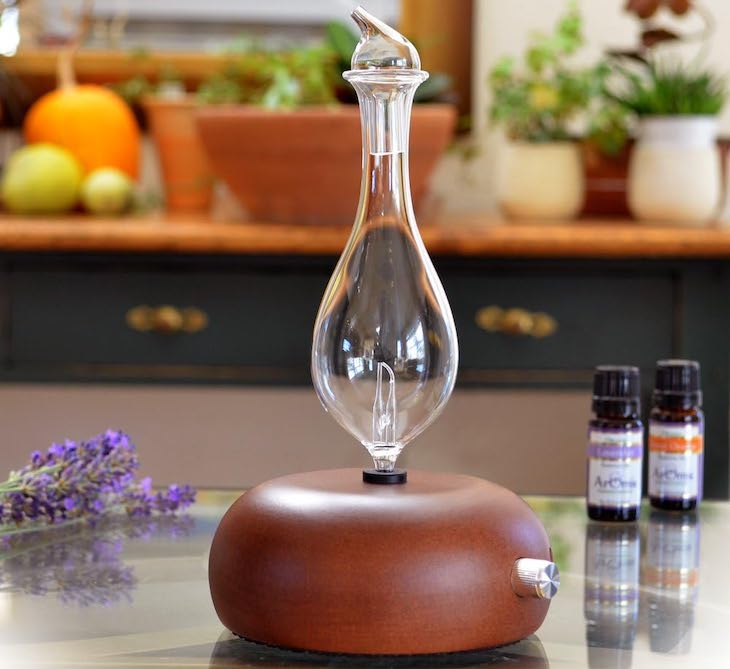
This nebulizing diffuser is a favorite of Levy’s, both for its aesthetics and its diffusion quality. “It’s easy to use, without needing water, and offers more powerful scents to your environment,” she says.
It features a unique glass silhouette with a wood base and has an automatic shutoff after four hours.
$89.99, amazon.com
Saje Aroma Om Ultrasonic Diffuser
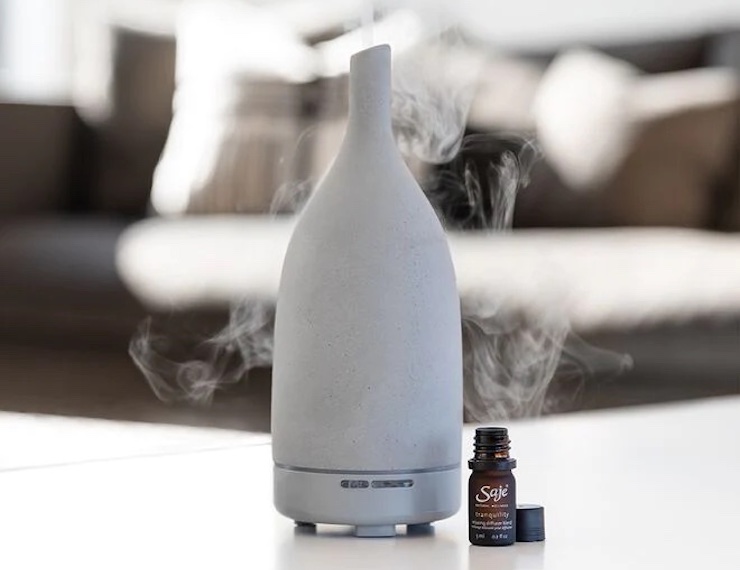
With a run time of up to 10 hours, LED lights, and a whisper-quiet diffusion, this essential oil diffuser is one of the best out there.
“I’ve had one of these for almost a decade,” says Decatrel. “I use it every day and it’s still going strong.”
$106, saje.com
AromaWell AromaStone Ultrasonic Diffuser
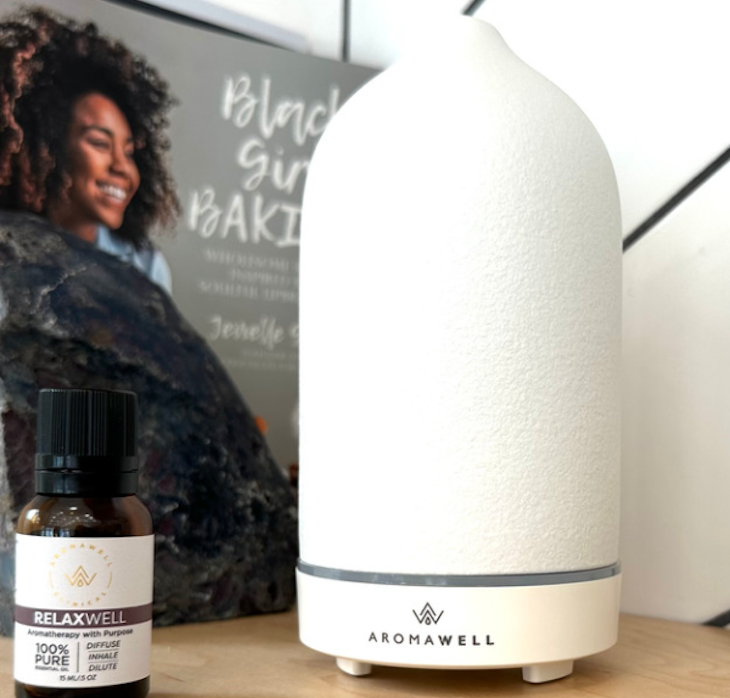
This best-selling diffuser from AromaWell diffuses for three hours continuously or six hours intermittently, features a soft light that can be turned on or off, and has an automatic shutoff function.
Plus, its simple design is a beautiful addition to your space. “Its classy, modern finish fits easily into most decor,” Wiehle says.
$139, aromawell.com
Seasons Soni SM Essential Oil Diffuser
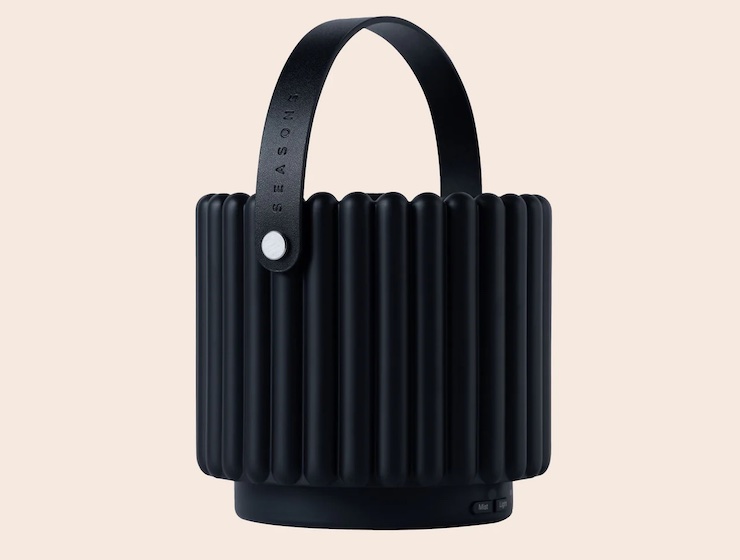
This one is my personal favorite. Not only is the design super chic—the ridged resin holder looks beautiful sitting on a coffee table or nightstand—but it’s packed with features that keep me using it night after night.
I especially love how far it transmits scent and mist, and its working time of up to 16 hours.
$135, seasonslife.com
How to use a diffuser
So, you’ve picked out your diffuser—now you’re wondering how to actually use it.
Make sure it’s clean
Be sure to pour out the water and wipe it down with a towel in between uses. This ensures that no mold or bacteria will grow inside the diffuser.
Use the intermittent setting
To avoid olfactory fatigue, Decatrel recommends using the diffuser’s intermittent setting.
“When you run the diffuser for too long, you stop smelling it, so it’s best to give it a break for maximum results,” she says.
She recommends using it for 30 minutes, then turning it off for two hours, and repeat.
Choose the right one for your space
As mentioned above, it’s important to pick an essential oil diffuser that will actually work for the size of your room.
Be sure the one you’re using covers the square footage so you can maximize its benefits.
Diffuse nightly
In order to take full advantage of an essential oil diffuser’s benefits, you should incorporate it into your nightly sleep routine.
“Our organs diligently engage in essential oil functions during sleep, including fortifying our immune system,” Wiehle says.
FAQs
Are diffusers good for your health?
Simply put? Yes. Using an essential oil diffuser has multiple health benefits, including reduction of stress and anxiety, boosting immunity, uplifting emotions, preparing oneself for a better night’s sleep, and even fighting inflammation.
Is it OK to sleep with a diffuser on?
While it’s safe to have an essential oil diffuser on during waking hours, you should actually turn it off while you’re asleep. That way, you won’t inhale too much of the essential oils and you also won’t run the risk of any unsafe electrical problems during the night.
What is the purpose of a diffuser?
An essential oil diffuser has both aesthetic and health benefits. A good diffuser will add beauty to your decor and can also help with a variety of health issues by breathing in helpful essential oils. “The best part is, all we have to do is breathe,” Wiehle says. Ahhhh.
Can white noise help you sleep better? Learn about the benefits of using a white noise machine as part of your nighttime routine.

